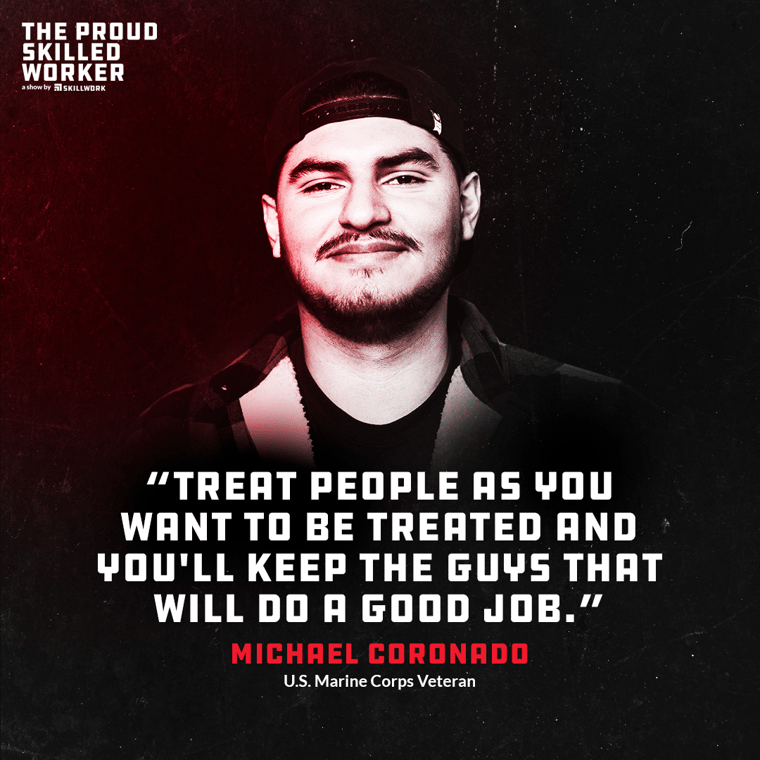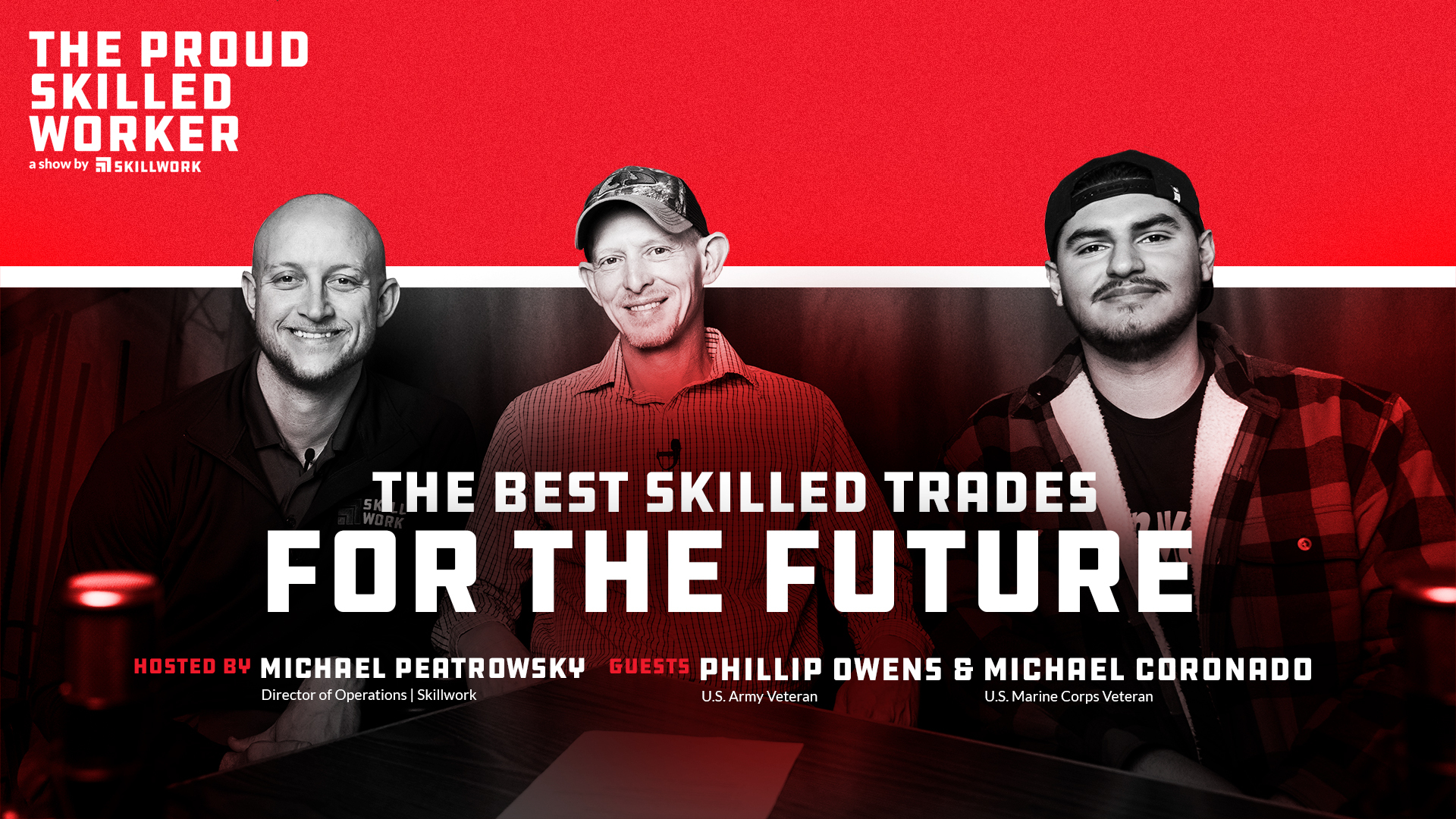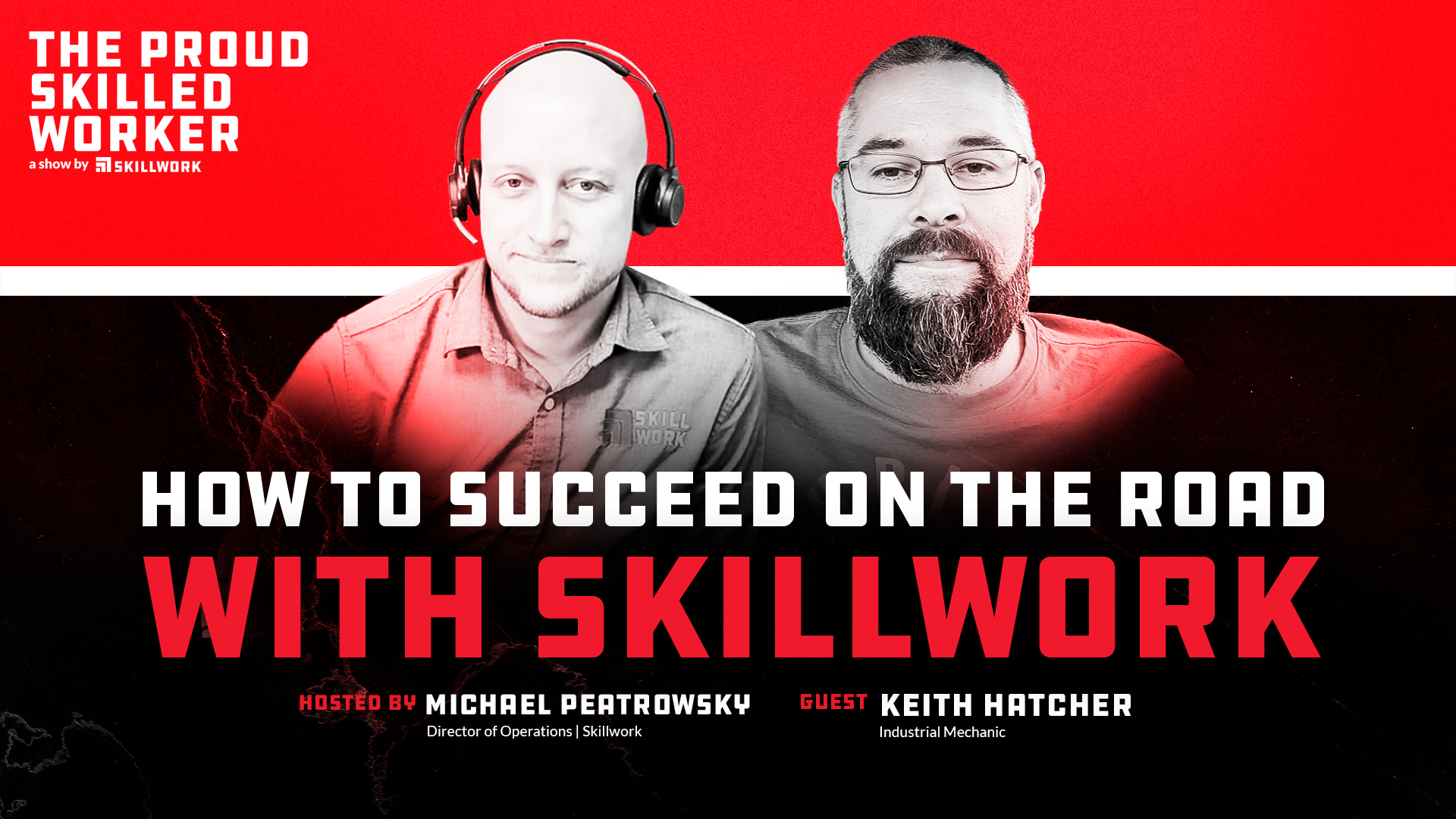The Great Resignation: Are You Trying to Relocate?
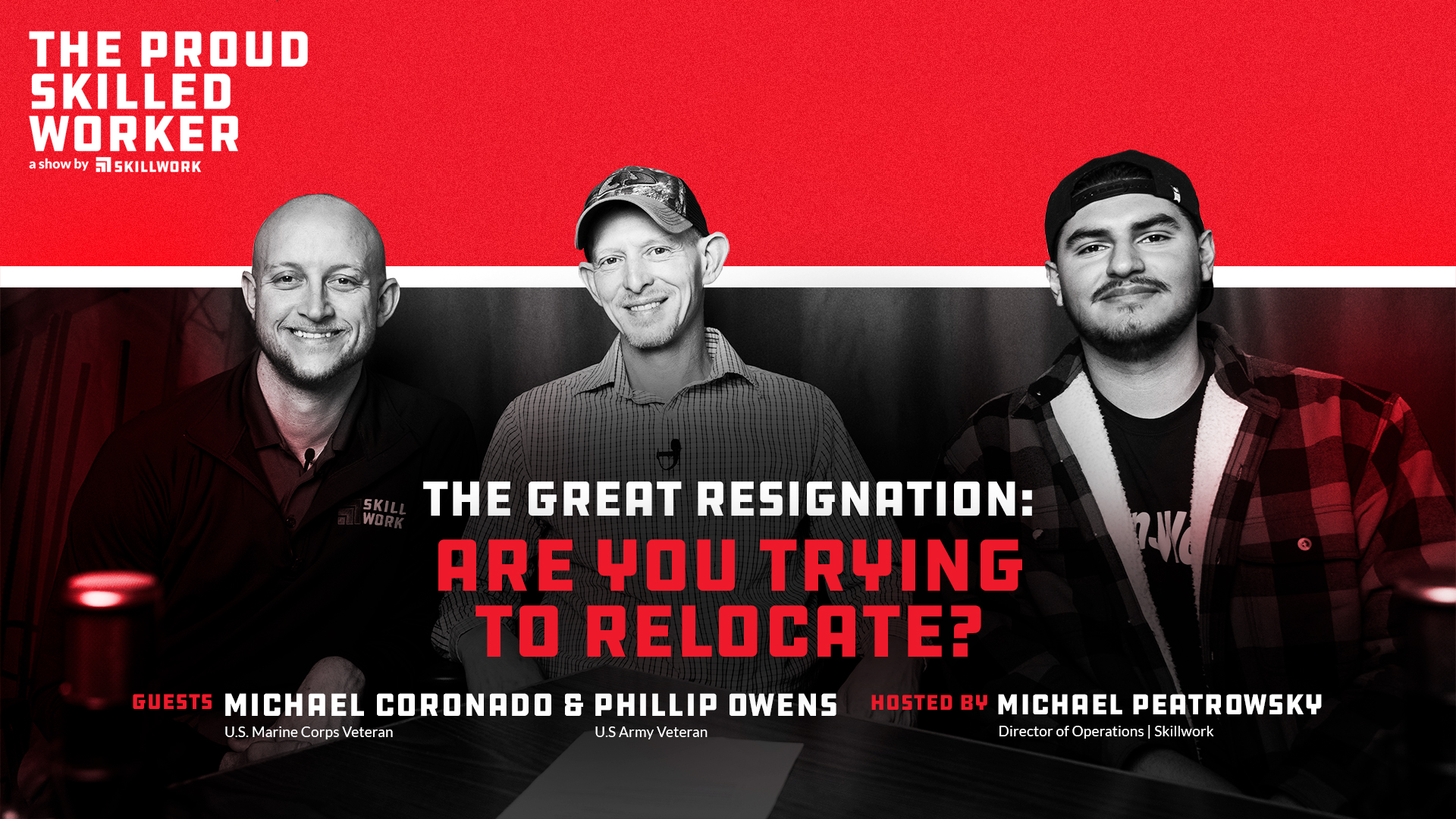
- Skillwork’s website: www.skillwork.com
- Skillwork’s LinkedIn: www.linkedin.com/company/skillwork
- Skillwork’s YouTube channel: www.youtube.com/channel/UCWZSf9KTuKudIm2buVFrhcw
- Rveal’s website: rveal.media
- Rveal’s LinkedIn: https://www.linkedin.com/company/rvealmedia/
- Rveal’s YouTube channel: https://www.youtube.com/channel/UC69p14R2ccMdyUbbmdlWCEw
Full Transcription:
Michael Peatrowsky 00:13
Hello and welcome to The Proud Skillworker. Today we have an opportunity to interview Phillip, a United States Army veteran and Michael, a United States Marine Corps veteran. What we're going to talk about today is "The Great Resignation" or "The Big Quit. We're seeing people leave their jobs in droves as unemployment rate is ridiculously low and open jobs are all over. Both of these individuals are perfecting their craft in the maintenance division. Michael is perfecting the automotive industry, while Philip works tediously, in the industrial maintenance field. We're gonna jump right in, we got a couple of questions, we want to ask them, and we really want to hear from the ground floor of these maintenance divisions. So first up, guys, why are people leaving companies?
Phillip Owens 00:54
I think it's a more of the lack of respect. It seems like there's, with not such so much the employees, but a lot of companies, I think are lacking, you know, the ambition, you know, to try to keep people. They seems to me that they have the, their motivation is, you know, I really don't care if you're here or not, because I have somebody else I can fill your spot, you know, all I have to do is just make a phone call, you know? There's no, there's no want to keep people. You know, they talk like, you know, we're going to accommodate these mechanics, we're going to accommodate these employees, but at the first chance they get, it's like, okay, we'll see you go because we're not going to do it this way. You know, we'll find somebody else that will do your job, and cheaper for better for whatever it is. It's they have no motivation to keep anybody and that's just my that's my belief from places I've been.
Michael Coronado 01:46
Yeah, I agree with him. I feel like money is a big part of it. Everybody's always wanting more money. I mean, billionaires are out there still working. But respect is one big one, like people think that they can just treat them however, and it's not how it is. You're not a number to them, you can easily go with Skillwork and find another job if they're not treating you right. And just treat people as you want to be treated and you'll keep the guys that will do a good job.
Michael Peatrowsky 02:14
Yeah, I think the one of the things I want to understand most and that everybody here is kind of looking for, is is what are people looking for in that perfect opportunity? So if you guys can kind of pour into "hey, if I showed up day to day this would be the perfect opportunity for me". What would that be?
Phillip Owens 02:32
I'd have to say that to be able to do our job. Right now this is it's hard because with the economy the way it is, it's hard to find the parts, it's and you're, we're always having to you know, manipulate things to make them work and it's like the company sits there and thinks that maintenance is just sit there with nothing else to do but just you know, get by with what you can instead of trying to fix it but they don't understand that it's hard to find the stuff to fix what we need to fix. And a lot of that stress and a lot of that kind of just comes back on maintenance for some reason. It's like it's always the maintenance fault and that's not the way it is.
Michael Coronado 03:19
Right now in the current job that I'm working I love it. I look forward going to work in the morning. I, the money I mean I get by with what I get, and like I save a certain amount. But I don't complain about it I just do my job. If we run out of a bolt, like right now we ran out of bolts and I got to cut them down and grind them off, I mean I'm there to work. And make it work if I have to. If we can't we build something together or just anyways but I, I love it. You just got to find something you love to do like I love working on cars but when I get off work I don't want to work on my car anymore because I just spent all nine hours doing it over there but still mean it needs to get done but I I love what I do now I just go to work. I mean the supervision, I don't, I think I've been trusted enough where I don't need to be eagle eyed over all the time. I mean yeah, we have one or two guys that look at me wherever but I'm doing my job. I know I'm doing a good, I don't like feeling of being watched. If I have to come in late I just text the boss be like, "I'm coming in a couple minutes late, truck needed to warm up a little more." And they are fine with that if you're a good employee they'll just they'll be cool with you. You can't you can't be too complacent in and get away with every single thing being on the phone all day and people hiding in the truck and being on their phone. But if you just respect the job and respect the work, you're there to work for them. Yes, they can find somebody else but is it going to be as skilled as you? You never know what just gotta, not love what you do but be be willing to do it good and if you feel like you can't, it's time to find a different trade.
Michael Peatrowsky 05:03
Yeah, I think, you know, for, for what I heard is you don't have to love what you do, but you gotta at least care about why you're doing it. Yeah. So that's definitely important. You brought up something I'm, um, I want to touch on is, you know, you can find somebody else to do it, but the skills won't be there. Do you guys feel like, in this season, in this economy and the climate we're in, your guys's skills are more desired now than they've ever been?
Phillip Owens 05:27
I'd say that's a yes and no. I mean, there's, there's companies out there, like the one I work for now. They take their mechanics, and they take mechanics that don't have really any mechanical skills, and they send them to school, they pay for their school, you know? So they have this, and, you know, that's one of the things that they call him apprentice, you know? That's one of the things that the apprentices like, because they get to learn new skills. They get to learn new trades, and the company has enough respect for them, you know, to keep them there. You know, "here's what we're going to offer you, if you want to stay here with this position, we're going to give you this", you know? And I think that's what a lot of it is. And then on the other. the other side of it, I've been in companies that I was like, like we said, you know, you're just a number, we have somebody else that can take your spot, you're here to get paid to do this job, whether you know, you have the stuff to do it, whether you have the skills to do it, if you don't want to do it, we'll find somebody else that will do it. And it just the high turnover rate in those companies is it's ridiculous. You know, I was at that I was at a company for seven years, I was a lead mechanic and then a maintenance supervisor. And it got to the point that you couldn't even keep people there. You know, I'd come to work and I had anywhere from my my normal crew four men, anywhere to 20 that you come to work at you come to work, and there might be 10 new people you never even seen before and never even got the chance to interview them never got a chance to talk to him. They just brought them in and says here, teach them.
Michael Peatrowsky 07:02
50% of your crew just show up.
Phillip Owens 07:03
And that's just, in that company was, that's what it was like. They want to talk about retention, but the company didn't want to back the retention. And it was hard for everybody. Because I mean, it's just more work if you have if you don't have the skills, it just makes it hard on the people that do have the skills because they're the ones that have to be the one making up the difference.
Michael Peatrowsky 07:23
Yeah, definitely, I think I think, as you said, respect and culture go a long ways. If you're constantly being pushed down upon from the top, pushed down, pushed down to achieve, but not given any tools or any ability or any support to achieve that. I think it makes it a little defeating to go to work. And then Michael, as you describe that care, that care will errode real quick. It's, it turns into, well, this is just a place I show up and while I get disrespected, I'm the only guy who's doing what I need to do. They keep bringing in people who aren't ready. So I think that, that that that leads to that, "why are people leaving?" It's the respect, it's the care, it's skills. But we'll circle back on that. But the this idea of apprenticeship programs and certifications and developing young maintenance technicians, I want to hit on that a little more. So think through some stuff that you, some programs you know of, because there's definitely some really good ones out there. But we need to we need to do a better job of spreading that. As we people walk back away from four year degrees into trade schools, we need to give everybody the opportunity. So Michael, what about yourself in the in the industry, you're in with your skills? I mean, do you feel like what you have and what you're able to give people is desired right now?
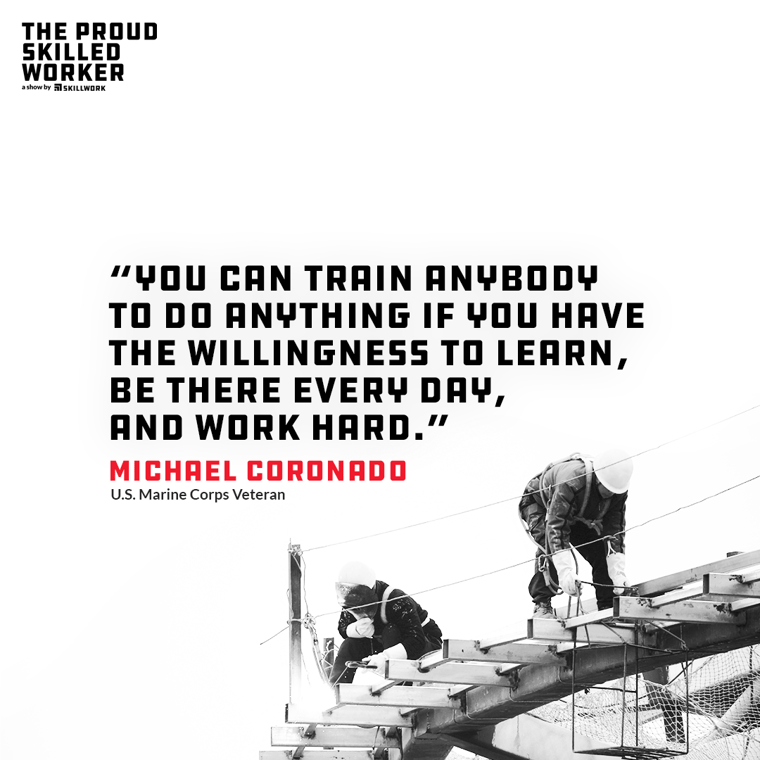
Michael Coronado 08:32
I feel like the attitude is, you can train anybody to do anything. But I think if you have the willingness to learn, and you're willing to be there every day, work your butt off every day. And just be willing to learn and if the old guy wants to teach you stuff you learn from him. Like right now I'm 23, I trained a guy who was 30, late 30s. And, I mean, sometimes he gives me backlash because I'm younger than him and he feels like he knows it, and he guarantees this but then it turns out I was right. Even in the military too I trained guys 18, 19, I was 20 and not much different, but my mentality is a lot different than the younger guys. I don't go out partying, I have a daughter, I'm married already. As long as you have the willingness to learn the willingness to take the criticism, I think you'd go a long way.
Michael Peatrowsky 09:22
Okay. What uh, for both of you guys, you guys are both current Skillworkers currently deployed with Skillwork. What is it that you guys feel Skillwork is doing different from your previous employers or from your previous past experience that that led you guys to want to be a part of this? This is an uncomfortable event guys, we all know what we're doing here. But you guys were adamant and you guys were willing to be a part of this and speak into this. So what is it that Skillworks doing different that makes you guys feel willing to do this?
Michael Coronado 09:53
I can say this with my whole heart and not because Skillworks my employer, Skillwork cares about their people and they go out of their way. I know my recruiter, he goes out of his way whenever I ask him, even if it's off off hours or off topic about the job, about my truck being stolen, and then they, it was in the company, they went and helped me look for it. You know? They just they care about the people. I don't even know how they're making money. Because with what I'm bringing in, I don't know how you guys are doing it. But I mean, you guys are doing a great job, whatever you guys are doing, getting people in and getting them where they need to be.
Michael Peatrowsky 10:29
Appreciate that. Yeah, no, it's definitely that's a huge concern for us is being able to show everybody in the industry, we're here, you're not a number. You're not, you're not a cog in a machine, you are the thing. You are the you are what's driving the force for us. So definitely great to hear that you're being serviced all hours of the day, you have everything you need, and you feel respected and valued. I appreciate that.
Phillip Owens 10:50
I agree. Completely with from the day I started here, no matter if I was 1100 miles away, 600 miles away, an hour and a half away, whatever, it didn't matter. I mean, somebody was always there constantly, you know, messaging, "hey, you need anything? I know, you're a long way from home, can we help you out with this? Can we help you out with that?" You know, and there was times you know, that, you know, things do happen, you know? Like, car broke down, you know? And we, you know, we had to spend a bunch of money to get the car fixed, or whatever it was, and you guys is right there saying, "hey, you know what, don't worry about it, you know, we'll get your hotel fees for the next two weeks, or whatever gets you back on your feet". You know? And it's not just that, you guys look out for the people that work for you, you know? And it's not, it's not so much "We're your employer, here's what this is, here's what's gonna happen." It's more like, "how can we make your day better?" And you guys have always been there. And I think that's one thing that a lot of companies need to understand you're going to keep the retention, you're going to keep the people if you give them that opportunity to know that they're actually cared for.
Michael Peatrowsky 11:55
Thank you. Yeah, I appreciate that. It's definitely it's an honor and a service for everybody in this building, to serve the the skilled labor industry and to serve the skilled labor market. I know that I've been a part of a lot of these stories and in hearing what you guys just described is, it's a blessing for us internally. Definitely something we appreciate hearing. Last piece I want to understand is what led you guys to Skillwork, like what led you here? What was the last moment where you went, "I'm out, I'm looking for a new job." And how, what led you to start looking for, for for a company like Skillwork?
Phillip Owens 12:32
Right? Honestly, I didn't even know a place like this even existed, you know? I was I was, I was a type of guy that, you know, I'd like I worked at that place for seven years, you know, and I got burnedout with the way they was treating people and then the ungodly hours, they just forced you to work for nothing extra, no incentives, nothing, you know? And then, uh, I had the opportunity to move to Laredo, Texas to work for this produce company, as a maintenance lead mechanic, and, you know, like, and, you know, that's 1100 miles away, but it's a change of pace of, change of scenery, it's changed to this, whatever it was. And I never even knew these recruitment companies even existed. And I went to this place in Laredo, Texas to work and it was not cut out to what it was supposed to be. It was nothing at what they said it was going to be, you know? Then I'm sitting there going, "Man, I wish I could just get back home and just go back to where I was at and do this, do that" and whatever it was. And then I had my resume on Indeed. And Todd calls me he says, "I just saw your resume on Indeed. How would you like to go to work for us for you know, traveling with incentives you know, different companies?" You know, that might be alright. So that's pretty much how I come to here and I've loved it every minute since.
Michael Peatrowsky 13:54
Good. Happy to be alright.
Michael Coronado 13:56
Yeah, I was just getting out of the military in June and I started with Skillwork late June. We I had a thing on Indeed, they contacted me, I went through I was also once I got out of the military, I attended a wind turbine or cell phone tower technician course. I got low voltage certified no in like high climb certified, but I don't like the height. So I'm not going to do that again. But after that I called Jason and should I say his name?
Michael Peatrowsky 14:32
Not you're fine it's alright.
Michael Coronado 14:33
I called my recruiter. And and it just went from there. I felt like I was bugging him every single day. Is there any news or any news? And eventually one day, "you got the green light", oh, cool. And then I'm packing my car, my wife and daughter being the next flight. But Skillwork has been a great blessing to me and my family. And I don't look forward to I mean, I don't look for it. I don't look to switch companies anytime soon.
Michael Peatrowsky 15:01
One of the things that that Skillwork is going to focus on really heavily, and I'll ask both of you guys in this, in the coming years is assisting veterans in the transition phase. I myself am a Marine Corps veteran who really struggled when I got out of the Marine Corps. Because there just felt like there was no support system. It's hey, we have your support, all the years you're in and then the next day that kind of crumbles and falls away from you. So Michael, and then Philip, I want you to maybe to think back on how valuable would it have been to have a company like Skillwork who can take you in kind of expose you to a wide variety of jobs and roles and companies on a "try before you buy" basis and kind of move around and really keep exploring your, your passions outside of the military. So you feel like that's an avenue military veterans should be looking at is through Skillwork, and really understanding that process?
Michael Coronado 15:51
100% I know. I know, guys who have taken their own life, because they don't know what they're gonna do when they get out. And I, that's one point, I was gonna say, I feel like, reach out to the eye, there's a Academic Center on each base, or even, you call the CO of a unit, they're always looking to help the guys out. And if they're not, I mean, they're doing wrong. But I, I've lost some friends to that. And I was not thinking of that, but I was also scared because I just had my daughter, married, I not gonna have a source of income, I need to buy milk, I need to buy food for the baby. And I mean, I can live off Top Ramen, but I, she can't. So I, I feel like if if they could give those guys a first chance at experiencing life and a new career instead of giving, like, there's always people that they're giving second chances to, but some people haven't even had their first chance. People who've served the country, I didn't go on a combat tour, but some guys who have and they are struggling on the side of the road. Just worried and they don't even know what's going going to happen after the next month they have left in the military. And sometimes their leadership fails them and they send them to the wolves, right when they get off and they don't have money to put gas in their car to drive home, or they go home and they start doing you know, ABCD drugs. It just sad reality. But that's the truth of it. And I feel like Skillwork, if they were able to, or if they were if the base was willing to accept, you know, this is for the guys, this for the skilled workers, because there's all kinds of maintainers out there and computer wizards out there. And they can there's tons of people getting out pretty much every day in the military. And I know people are looking for jobs. And those guys, they if you give them the right respect that they want that they didn't get in the military, they'll do great in the industry. Any industry.
Phillip Owens 17:44
For sure. I agree. You know, I got out of my, when I got out of the military, it was 1999. So a lot's changed since,
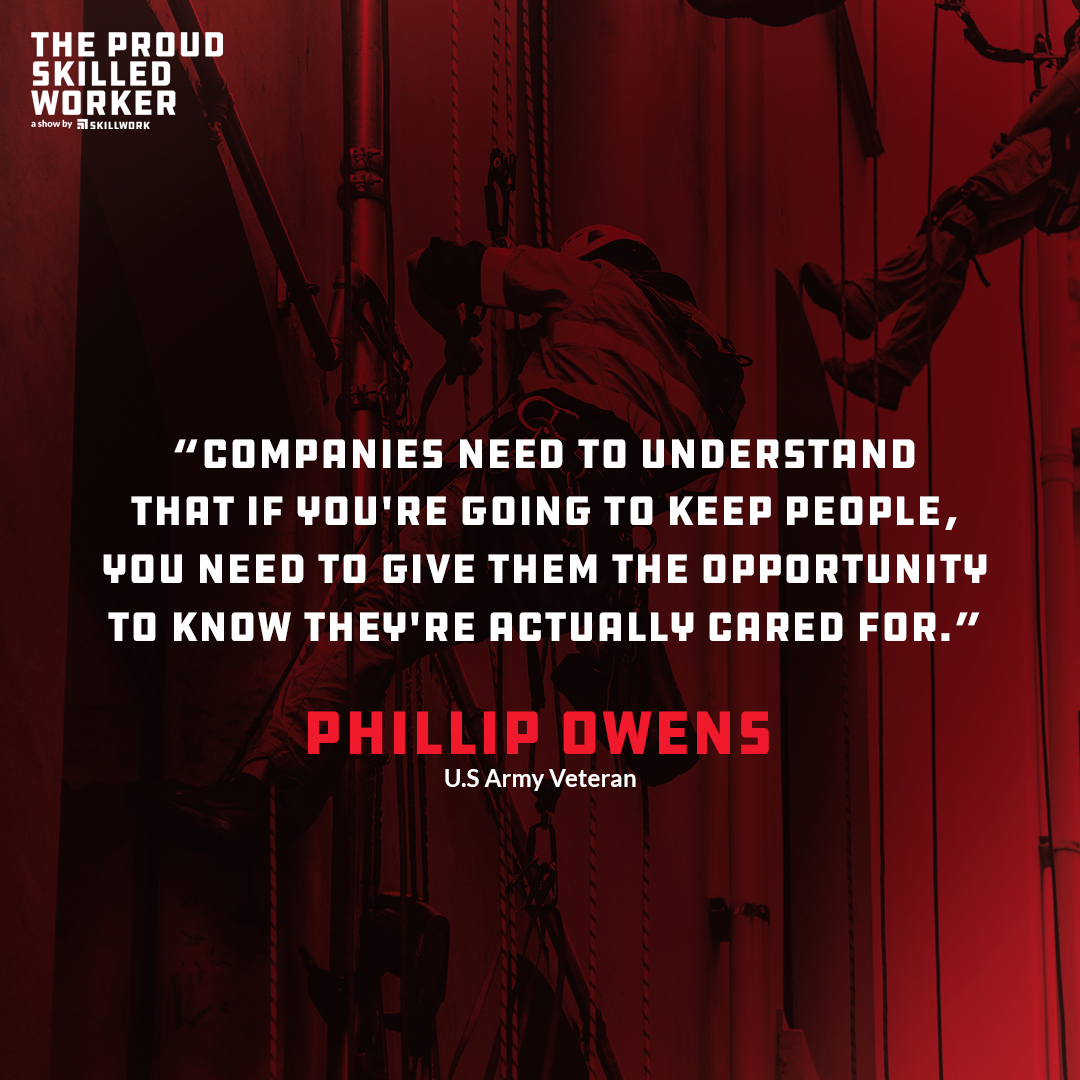
Michael Peatrowsky 17:55
Just yesterday.
Phillip Owens 17:57
Just yesterday, that, uh you know, I, I have friends that, you know, just got out of the military or, you know, still currently in the military. And sometimes you know when I'm talking to them. It's like, you know, they don't have that sense of purpose. They're like, "Oh, my, what happens when I get out? What am I gonna do?" You know, there's, there's jobs out there, what do you want to do? Well, that's it, I don't know, because I've been doing this for so long. I don't know what else is out there. I don't know what I can do to you know, feel a part of something. And I think that's where Skillwork's, you know, tries their best to give everybody a sense of purpose and try to be there to, you know, help people adjust to the new life. And I think that's, I know, Skillwork's, focuse is a lot on just veterans, you know? And that's, that's to give somebody a sense of belonging and say, "You know, what Skillwork is my family, Skillwork is always there for me, you know, Skillwork is my friend, you know, it's given me a place where I belong". And I think that's a I think it's a good thing that a lot of companies don't have, they don't even try to have so. I mean, I appreciate it.
Michael Peatrowsky 18:57
Yeah, absolutely. Yeah, it's definitely a big push for us. Veteran owned company, we have probably 30% of our current staff are veterans. It's a huge push for us to bring more into the fold. As Michael, you said it best, that attitude, that demeanor, the way that the veterans carry themselves, can fit into any industry if you just give people a chance.
Michael Coronado 19:18
And safety first, is always, with those guys, that's hammered into their brains about safety and you got your mix ups one, one or two or maybe three times for some guys, but I know safety is always number one priority for those guys. And they're looking forward to going back home because some of them have families, some of them single, they want to go hang out with their friends. Still priorities are to be safe at work. And every Friday safety briefing. You you went to those?
Phillip Owens 19:19
Oh, yeah.
Michael Coronado 19:23
And I mean, I when I first started, I thought there was going to be oh, there's no, no talk on Friday or nothing is just hard kind of get back into the routine of regular stuff, but yeah.
Michael Peatrowsky 19:55
Yeah. So my last question is if you guys could say say one thing to a hiring manager or retention team, to to an individual to help them keep keep more people on the floor to stop this quit, to stop this great resignation period that we're in, what would that one thing be? If you could say one thing to them?
Phillip Owens 20:14
Stop and listen to your employees, you know? Don't be, don't say, "Okay, I'll listen to what you have to say". But then just ignore everything that was said, you know? There's, if you're if you're allowing somebody to express their feelings and say what they need to say, or you know, try to improve things, or this is where we're wrong, this is what we're doing, you know, take that into account, you know? Think about, is this the only per employee that saying this? Maybe I need to go talk to another one or go talk to another one, instead of going, "you know, what, forget it, you know, like, you're not saying what I want to hear", you know? And that's where I think that a lot of them would keep more if they would actually get involved with actually wanting to keep the people. Yeah.
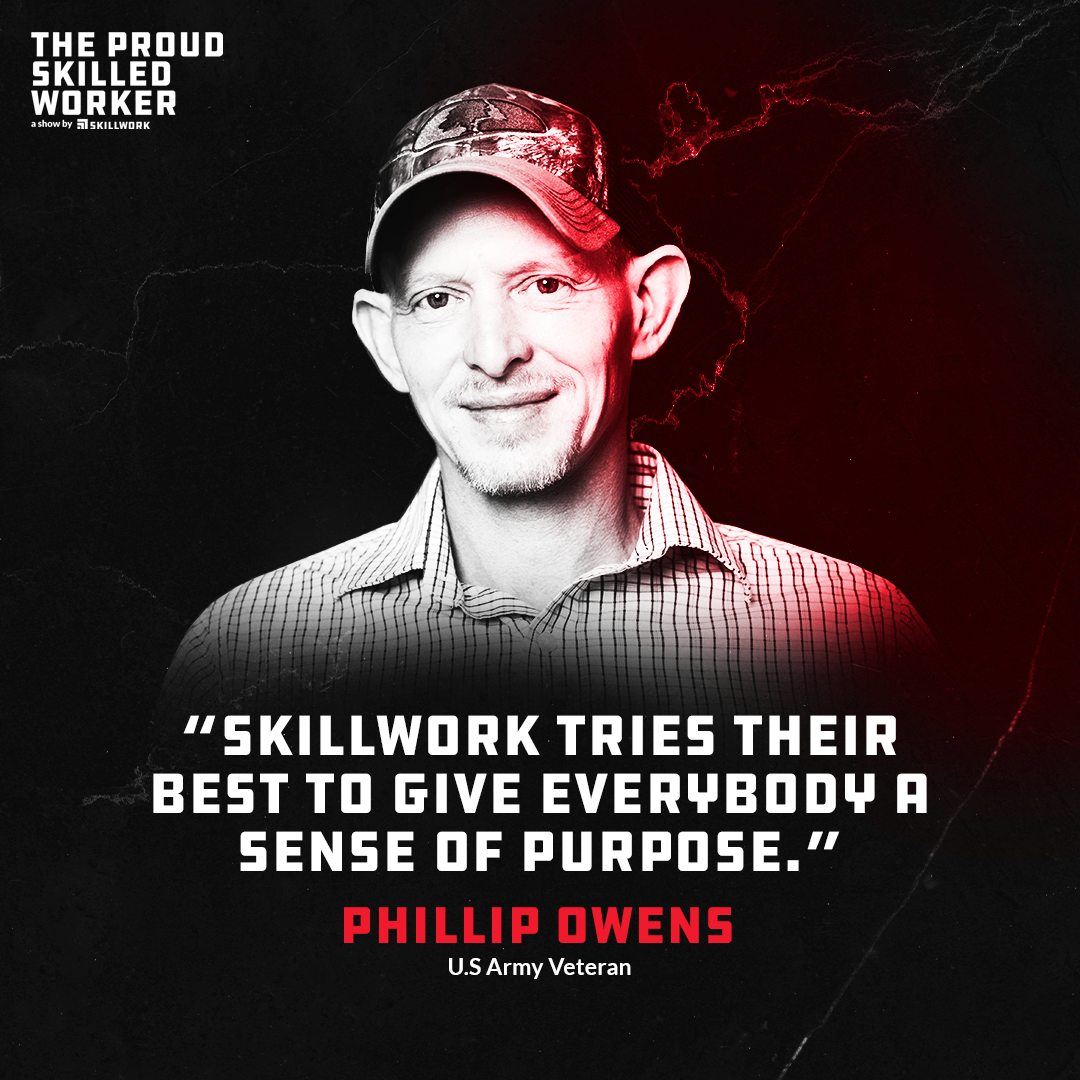
Michael Coronado 20:54
I agree with him. But I would also say like, don't treat your employees like they're animals, you can just find another one, throw this one away. Because my mentality of it is, no one's gonna talk to me like that. No one's gonna see, like, I don't know how to explain it, but no one's gonna talk to my daughter's dad, me myself, like that. And no one's gonna see me get pushed to the ground, I stand up for myself. And just gotta remember that these are grown men you're working with or women. And you know, they have kids looking for them there. There's somebody's son or daughter, have respect for people and you'll thrive in your business.
Michael Peatrowsky 21:32
Yup. Have respect for people, I think definitely is the kind of common thread that you both have had today is have respect for people. And that goes a long ways. Thanks, everybody. Appreciate you guys taking time to tune into The Proud Skillworker. Tune in next week. We got another great one.
